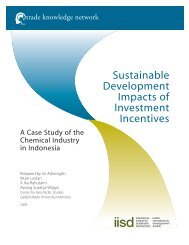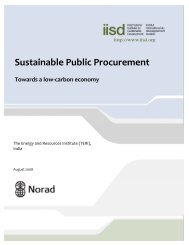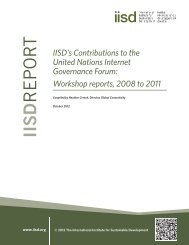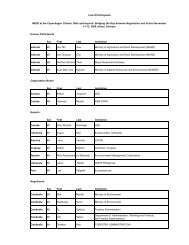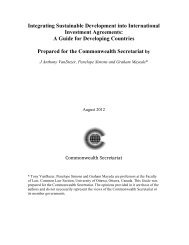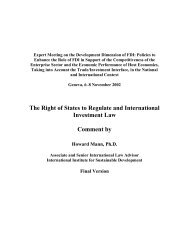Manitoba Climate Change Task Force - International Institute for ...
Manitoba Climate Change Task Force - International Institute for ...
Manitoba Climate Change Task Force - International Institute for ...
You also want an ePaper? Increase the reach of your titles
YUMPU automatically turns print PDFs into web optimized ePapers that Google loves.
12<br />
MCCTF Report 2001 — <strong>Manitoba</strong> and <strong>Climate</strong> <strong>Change</strong>: Investing in our future<br />
These changes could significantly impact northern peoples and tourism operations<br />
that rely on hunting and fishing. The timber industry will be particularly<br />
affected as yields are reduced, susceptibility to pests and disease increases and<br />
<strong>for</strong>est fires become more frequent due to drought. The <strong>for</strong>estry industry may<br />
also be vulnerable as its international competitiveness and market share decline.<br />
Opportunities exist, however, to adapt to and benefit from these changes. For<br />
example, with careful planning, <strong>for</strong>ests could be managed as carbon sinks. Waste<br />
wood could soon be used in the production of ethanol, an alternative to gasoline.<br />
The key challenge <strong>for</strong> <strong>for</strong>est-dependent sectors and communities will be to develop<br />
creative and adaptive management strategies that enhance both the ecological<br />
resilience and the diversity of the economic benefits from <strong>Manitoba</strong>’s <strong>for</strong>ests.<br />
Energy<br />
“Energy efficiency will benefit the consumer, resulting in more disposable income,<br />
increased spending in non-related sectors, more com<strong>for</strong>table and quiet and safe<br />
buildings and decreased lifecycle costs and improved indoor air quality.”<br />
Ryan Dalgleish • National Energy Conservation Association<br />
The implications of climate change <strong>for</strong> <strong>Manitoba</strong>’s energy sector, including<br />
electricity production are varied. Nearly all the energy produced in <strong>Manitoba</strong> is<br />
hydroelectricity, which accounts <strong>for</strong> most of our electricity consumption.<br />
Hydropower is generally considered to be “climate-friendly.” The net effect of<br />
changing precipitation patterns on hydropower resources is uncertain.




